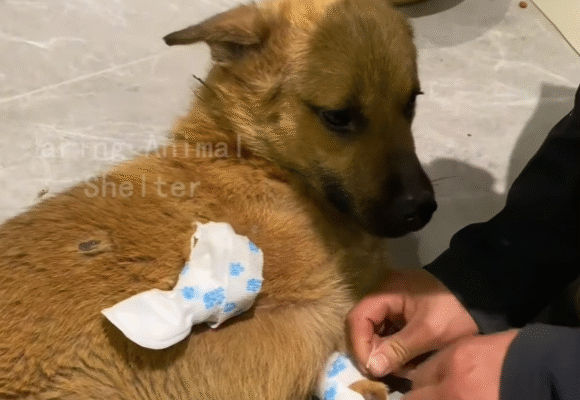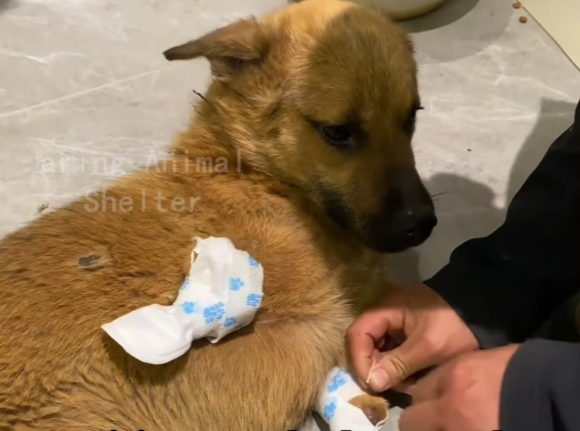
The first time I saw him, the world seemed to stop for a moment. It was early morning, the streets still quiet, painted with the pale light of dawn. A faint sound—half a whimper, half a dragging noise—made me turn my head toward the alley behind the old bakery.
That’s when I saw him.
A dog—thin, dirty, and broken—was trying to move forward, using only his front legs. The back half of his body lay motionless, twisted awkwardly. Each time he pulled himself forward, his nails scraped painfully against the rough pavement. It was a sight so heartbreaking that for a second, I couldn’t breathe.
He was crawling, inch by inch, leaving a faint trail of dust and blood behind. His eyes—oh, those eyes—were full of exhaustion, but still burning with something deeper: the will to live.
He looked up at me, head trembling, chest heaving. It was as if he was saying, Please, don’t leave me here.
I knelt down slowly, trying not to scare him. His ribs were sticking out; his fur was matted and full of wounds. His back legs… they were lifeless. I touched his paw gently, and he let out a weak whine but didn’t resist. That trust, even after everything he’d been through, shattered my heart.
I whispered softly, “It’s okay, boy. You’re safe now. I’ve got you.”
Using my jacket, I lifted him carefully into my arms. He was so light—just skin, bones, and silent pain. His head rested against my chest as I rushed toward my scooter, every second feeling like a battle against time.
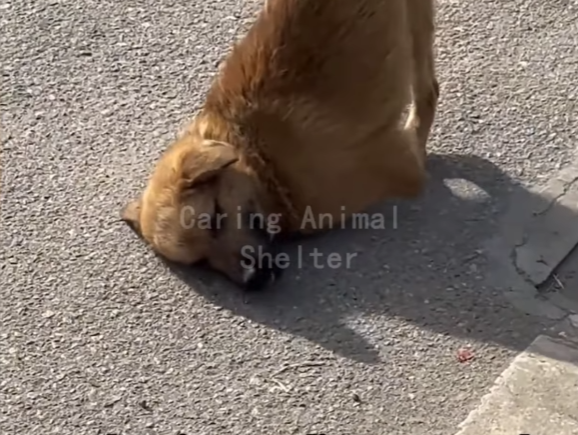
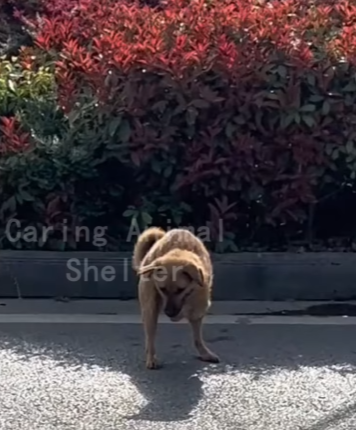
At the vet clinic, the nurses gasped when they saw him. The vet, an experienced woman named Dr. Srey, quickly examined him. After a few minutes, she sighed deeply and said, “He’s paralyzed from the waist down. Most likely hit by a vehicle days ago. He’s severely dehydrated and infected. It’s a miracle he’s still alive.”
My stomach turned. “Can he… recover?”
She hesitated. “He might never walk again. But with care, he can live—if he still wants to fight.”
I looked at the dog lying on the table, his eyes half-closed but still watching us. He had already survived what most wouldn’t. “Then we fight,” I said firmly. “We give him a chance.”
We named him Hero.
Over the next few days, Hero stayed in the clinic under constant care. They cleaned his wounds, treated his infection, and gave him medicine for the pain. The first few nights were hard. He cried softly in his sleep, twitching as if reliving the accident. I sat by his cage, gently stroking his head, whispering, “You’re not alone, Hero. I promise.”
After a week, Hero began to eat again. Just small bites of boiled chicken, but each one felt like a victory. His eyes started to regain a faint sparkle, and when I walked into the room, he would wag his tail—only the upper half of his body moving, but with pure joy.
It broke me and healed me at the same time.
The vet eventually fitted him with a small wheelchair—two little wheels attached to a harness that supported his back legs. The first time we put him in it, he looked confused, unsure. But when he realized he could move again, his face lit up. He barked for the first time, a sound so full of life it brought tears to everyone’s eyes.
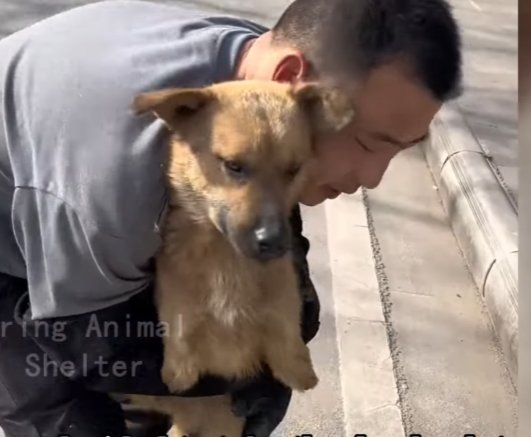
He rolled forward, then backward, then forward again, tail wagging like crazy. The clinic staff clapped, cheering him on. That day, Hero truly lived up to his name.
Still, the road to recovery wasn’t easy. His wounds took weeks to heal, and the emotional scars—those were deeper. Sometimes he’d stare at the door for hours, as if waiting for someone who would never come back. No one knew his past, but his body told the story of hardship, hunger, and neglect.
One afternoon, I sat beside him under a mango tree near the clinic. The sunlight danced through the leaves, and Hero lay beside me, resting his head on my leg. I looked at his small wheelchair and then at his calm, grateful eyes.
“You’ve been through hell, haven’t you?” I said softly. “But you didn’t give up. You crawled, you fought, and now look at you—you’re alive.”
He wagged his tail gently, as if he understood.
Every day, Hero grew stronger. He learned to race through the clinic halls, bumping into walls but laughing in his own doggy way. He greeted everyone with his goofy grin and bright eyes, spreading warmth wherever he went.
People came and went, but Hero stayed by my side. He had become part of my life—a reminder of courage, of hope, of love that needs no words.
Then came the day when the vet said, “He’s ready to go home. Do you want to foster him, or…?”
I smiled. “No need for foster. He already has a home—with me.”
Bringing Hero home was one of the happiest moments of my life. I built a small ramp so he could go in and out easily. I covered the floor with soft mats to protect his belly as he rolled around. At first, he followed me everywhere—room to room, always watching, always afraid I might disappear. But soon, he started exploring on his own, sniffing every corner, barking at birds through the window.
Watching him play with the neighborhood kids was pure magic. He’d chase after them in his little wheels, barking excitedly, while they laughed and clapped. To them, he wasn’t a disabled dog—he was just Hero, the happiest dog in the world.
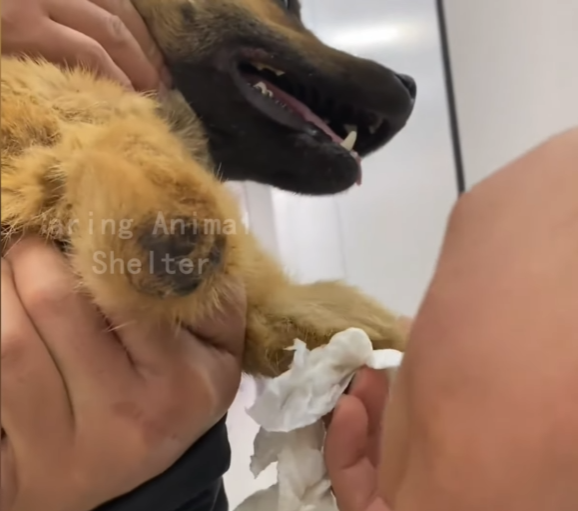
Months passed, and Hero became a local legend. People often stopped by to see him, bringing treats and toys. His story spread online, inspiring thousands. Messages poured in: “He’s amazing!” “What a brave soul!” “Thank you for saving him.”
But the truth is—Hero saved me, too.
There were days before I found him when life felt dull, directionless. But seeing his determination to keep living, even when his body was broken, reminded me of something precious: the beauty of persistence, the power of compassion.
One evening, as the sun set in a burst of gold, I sat with Hero in the yard. He rested beside me, watching the horizon. A soft breeze brushed past, carrying the scent of blooming flowers.
“You know,” I whispered, “the day I found you, I thought you were dying. But maybe… that was the day you were reborn.”
He looked at me, eyes full of peace. Then he did something he’d never done before—he placed his paw on my hand, gently pressing it as if to say, Thank you.
Tears filled my eyes. I smiled and whispered, “No, Hero. Thank you—for showing me what strength really means.”
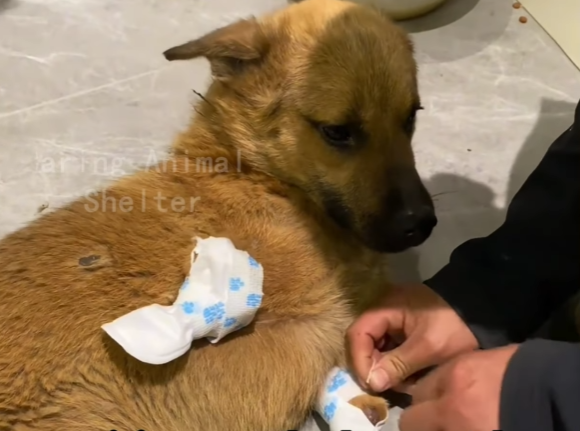
Now, every morning, I wake to the sound of his wheels rolling across the floor, a cheerful bark echoing through the house. The same dog who once dragged himself through the dirt, too weak to lift his head, now races toward life with unstoppable joy.
Hero may have lost half his body, but his spirit remains whole—stronger than ever.
And sometimes, when I see him lying under the sunlight, tail flicking gently, I think of that first day in the alley—the broken creature crawling for his life.
He was too tired then, too broken to stand. But he kept moving.
Because even when the body gives up, the heart never does.
And that’s why Hero will always be more than a dog to me—he is living proof that courage can crawl through pain, drag itself out of the darkness, and still find the strength to shine. 🐾
